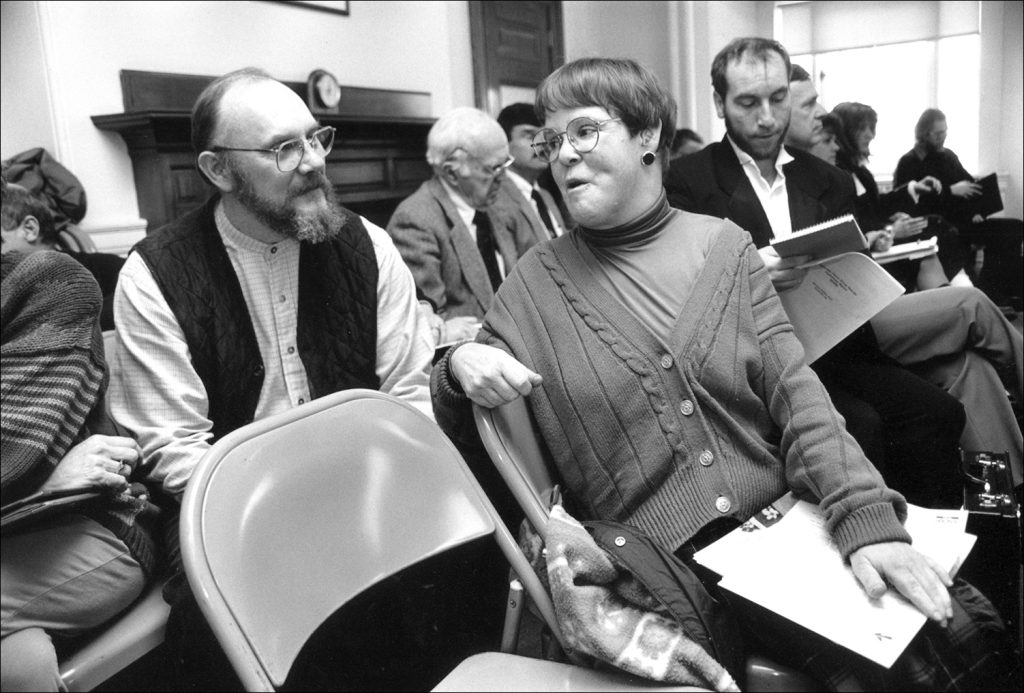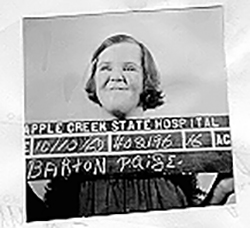All quoted material and photos are from the book, Beyond All Expectations: The Story of Paige Barton (2003), and are courtesy of the author JoAnne Putnam and the publisher, the University of Maine Center for Community Inclusion and Disability Studies. If you would like to know more about Paige’s life, this book can be purchased here.
Paige Barton was born in 1951 in Pittsburgh, PA, and as an infant was diagnosed with Down Syndrome – though much later it would turn out that she had a different developmental disability, Trisomy 18. She was sent to an institution at age 15, not Pineland, but Apple Creek State Hospital in Ohio. That institution also had started with a familiar name: The Apple Creek School for the Feeble Minded.
Despite performing within the “average” range on the IQ tests given to her upon admission, Paige remained at the institution. “[She] was appointed to the position of Patient Aide. The Patient Aides were assigned to work with the young children with severe disabilities.”
The work given to her as a Patient Aide “infused meaning into Paige’s life in the institution . . . Caregiving gave her an opportunity to contribute to the lives of others. But other aspects of Apple Creek were far worse. “Paige was put on a regimen of Thorazine…a powerful antipsychotic drug,” despite not suffering from psychosis.
“I do remember getting very angry about the conditions and the treatment we received in the institution, but it didn’t do any good,” recalled Paige. “I guess this [the medication] was their way of helping a person adjust to her surroundings…I felt like a zombie because they had me drugged up. I felt like I didn’t have any value to anyone and never would.”
Paige would also be subjected to days of solitary confinement for running on an outdoor deck and received electroshock treatments without her consent.
“I was lonely, angry, and confused . . . It was a desolate time in my life,” said Paige. “When I first came to Apple Creek, I was convinced that I didn’t belong in the institution, but as time went on, I began to doubt myself.”
Paige went on to live in other, less-restrictive congregate settings, but it took “passing” another IQ test to convince those charged with her care that she did not belong in an institution. After finally being allowed to return to the community, she moved to Maine to be near family. Paige also worked to get her GED despite having no high school-level education, and used that diploma to pursue a college education at the University of Maine, Farmington.
“I love working with children and would like to get my Bachelor’s in Special Education . . . This was another barrier I faced – the fact that my family and a lot of people said I couldn’t accomplish this. It hasn’t been easy and it isn’t over yet but I feel I can accomplish this goal. It may take me longer than some people, but I can do it.”
In 1991, Paige Barton graduated from the University of Maine Farmington with a bachelor’s degree in General Studies. While she did not achieve a degree that would allow her to work with children in special education, she soon got a job with Community Support Services, Inc., a Maine service provider, “organizing support groups for people with disabilities who wanted to leave group homes and move into their own apartments. Paige herself came up with the job title of ‘Self-Advocacy Organizer.’”
Through the early 1990s, Paige devoted her work and volunteer time to building capacity for self-advocates in Maine, serving on multiple boards and developing several self-advocacy groups. In 1993, she organized the first annual Speaking For Ourselves Conference and 300 people attended the event. Paige was inspired by the national People First movement and sought to form a Maine chapter.
At the same time, a three-year grant (1993-1996) was awarded to the University of Maine Center for Community Inclusion to support people with disabilities in their efforts to establish a strong statewide self advocacy network. The project was called “Creating Self Advocacy Networks in Maine” and was funded by the Maine Bureau of Mental Retardation and the Maine Developmental Disabilities Council.
The project resulted in more than 18 self-advocacy groups meeting all over the state; more than 50 individuals with intellectual or developmental disabilities participating in leadership education; and representatives from self-advocacy groups holding seats on many local, state and regional boards and advisory panels.
Today at over twenty-five years strong, Speaking Up for Us is Maine’s statewide self-advocacy organization; run by and for adults who live with developmental disabilities.
“The notion of ‘Dignity of Risk’ often cropped up in Paige’s conversations. To her, dignity of risk entailed having choices and options, and sometimes required taking chances. It meant having the opportunity to succeed as well as the opportunity to fail.”

Paige Barton passed away in 1999, but her legacy lives on in the countless lives she improved through her advocacy: “You can do it. You can speak up for yourself!”

